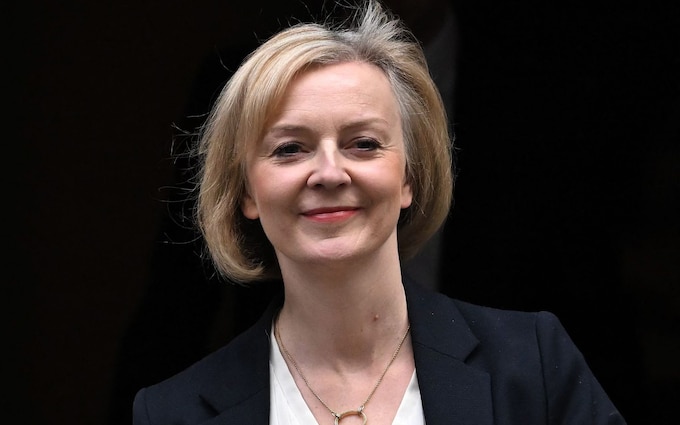Truss had it right – there’s only one way out of this mess.
Investors are no longer willing to pay for Britain’s zero-growth, high-inflation economy
‘Trussonomics’ was branded crazy but Sunak’s ‘safe’ approach has triggered similar bond market turmoil CREDIT: Ben Stansall/AFP
When the bond markets dramatically turned on the UK in the wake of the disastrous mini-Budget last autumn, it prompted lengthy lectures on the crazy excesses of “Trussonomics”.
Wild and risky “unfunded tax cuts” were to blame. Lower rates for the rich would widen inequality. The mad dash for growth, which led to a disregard for fiscal caution, was tantamount to a full-scale assault on the anti-growth coalition.
But hold on.
This week we learned that a boring risk premium is every bit as worrying as the “moron risk premium” (as one City analyst famously dubbed the market ructions of last September).
With borrowing costs rising to the highest level in the G7, and the UK’s creditworthiness again under threat, one point is surely clear.
Britain’s reckoning with the bond markets has been a long time coming – and whoever is in charge can no longer fool themselves into believing that “free” money can be magicked out of nowhere forever.
The past week has been every bit as brutal for the UK gilt market as the drama of last September.
In the wake of another set of dismal inflation figures, which suggested rising prices are becoming as deeply embedded into the British economy as they were in the 1970s, investors moved decisively to sell off UK government debt.
Yields on 10-year bonds soared to 4.31pc, overtaking even Italy, and hitting the highest levels since last autumn.
As market expectations for the interest rate set by the Bank of England rose, so too did mortgage rates. It surely can’t be long before we see cracks in the financial system and, possibly, with wearying familiarity, emergency intervention from the Bank.
It is beginning to look like the sell-off last year was the early stages of something far bigger – and far more worrying.
The bond markets no longer want to finance the profligacy of the British state and our determination to live way beyond our means, at least not without a high fee in return.
Britain is increasingly becoming a poor country that acts like a rich one.
Rishi Sunak convinced the public – and possibly himself – that the Government simply needed to push through some unpopular tax rises, make some “tough choices” on spending, and let the “grown-ups” from the Treasury set policy.
Once that was achieved, so the logic followed, this period of economic turbulence would finally come to an end. But it was always a fiction.
The UK’s finances are unsustainable. The most recent Budget left departments’ spending totals mostly unchanged, with extra money for defence and childcare, but no meaningful cuts until after the next general election.
As the latest set of borrowing figures revealed, we are still a long way from balancing the books.
After a big jump in 2020, government debt as a proportion of GDP remains close to 100pc. Since the economy is looking incapable of growth, that is only going to go up, even if we don’t commit to borrowing more.
Our central bank has lost control of inflation, as evidenced by the rise, not fall, in core inflation in April.
Even the headline rate remains stubbornly high, at 8.7pc, with food prices alarmingly sticky.
Chancellor Jeremy Hunt said earlier on Friday he would be comfortable with a recession if it brought inflation down. This is the terrible choice the Government has left itself with: persistent inflation or an economic contraction.
Unless we kick our addiction to low growth and debt, the situation will only worsen.
The Treasury’s forecast that it will raise £17bn through higher rates of corporation tax will likely prove as inaccurate as many of its other predictions.
It will only take a handful of private businesses to relocate overseas for the sums to fall far short of what is expected.
Our marginal income tax rates, meanwhile, are now hitting an exorbitant 70pc for many couples with both children and student loans, once tapered allowances and child benefits are taken into account.
Perhaps worst of all, a looming Labour government would spend much more, with seemingly no idea how it is going to pay for it all.
Labour has big plans for a green energy giant, for an interventionist industrial policy, not to mention pay rises for some of its public sector trade union backers.
Yet apart from its plans to tax wealthy foreigners and slap VAT on school fees, it is hard to discern how it plans to pay for it. Against that backdrop, why would anyone want to own gilts with a negative real yield of minus 4pc?
This could be far worse than the crisis we faced last September. For all its flaws in terms of communications and execution, at least the Truss government was borrowing money to finance growth and reform.
The Sunak administration is borrowing to pay for stagnation, and Labour will be borrowing to pay for a massive expansion of the state.
The only genuine way out of this mess is to get the economy growing again.
This is not impossible. We could rip up planning restrictions to start building homes. We could finally diverge from EU regulations. And we could lower taxes on business and entrepreneurs to reboot investment, with personal tax cuts to follow from the proceeds.
Instead, we have chosen to carry on living in a magic money tree fantasyland dressed up as fiscal responsibility.
The bond markets appear to have twigged that the UK is stuck with zero growth, with sustained inflation, and has lost the will to reform itself. So long as this remains the case, they will keep demanding a higher and higher price to lend us money.
The sell-off in gilts last September was just the start: the British debt crisis is going to get a lot rougher in the future. DT.
Blogger: she was almost certainly on the right track but tried to do everything in one go. Lacked political nous.


.jpeg)